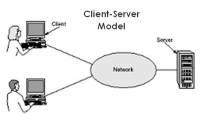Welcome to the sequel to The Alexandria Project, a cybersecurity thriller. If you'd like to read the book this series is based on, you can read the first three chapters for free here.
 Frank looked hungrily at the establishments on both sides of the main drag of Cedar City, Utah. He’d lost eighteen pounds, and it was payback time.
Frank looked hungrily at the establishments on both sides of the main drag of Cedar City, Utah. He’d lost eighteen pounds, and it was payback time.
It had been early that morning, before sunrise, that he had left his campsite on the North Rim of the Grand Canyon. Now it was almost Noon, and he was a third of the way through Utah and had waited long enough. Impatient drivers swung around him as he motored slowly up the street, compiling a mental list of every restaurant, bakery, ice cream store and other variety of food emporium he encountered along the way.
This series highlights aspects of my experience self-publishing The Alexandria Project. If you'd like to read the book this series is based on, you can read the first three chapters for free here.
 This week we’ll talk about how to come up with the “right” price for your book in each of the formats in which you plan to make it available (eBook, soft, and/or hardcover). By "right" price, I mean a price that will make more, rather than fewer, people actually buy your book. My challenge will be to convince you that the title you see above makes sense.
This week we’ll talk about how to come up with the “right” price for your book in each of the formats in which you plan to make it available (eBook, soft, and/or hardcover). By "right" price, I mean a price that will make more, rather than fewer, people actually buy your book. My challenge will be to convince you that the title you see above makes sense.
But first, let’s cover the basics – how the pricing process works, and the factors that may put a floor under your book price.
Welcome to the sequel to The Alexandria Project, a cybersecurity thriller. If you'd like to read the book this series is based on, you can read the first three chapters for free here.
 “That’s right, Vicky. Simple as that. So can you guys take it from here?”
“That’s right, Vicky. Simple as that. So can you guys take it from here?”
“Sure thing, Frank. No problem, and great work!”
In fact, it hadn’t been great work that had finally allowed him to crack the mystery of the flipping poll numbers. Just greater attention to detail. Once he had spotted the few extra bytes of code in the server’s time check code he knew that he’d found the chink in the system’s armor that the hacker had exploited. After that, it had been relatively easy to figure out what happened next.
Settling back in his chair, he stared out across the magnificent void of the Grand Canyon, and then smiled wryly. Not quite a perfect metaphor for his state of mind, but it would do. He felt good about cracking the problem he had been tasked to solve, yes, but now what? Suddenly he was at loose ends again, with nothing to fill his time except the fading goal of writing a book.
And indeed, I’ve been amazed at how terrible some self-published books look. One of the guides I bought, which is something of a bible on self-publishing and has gone through many editions over the past 20 years, truly looks like …
Welcome to the sequel to The Alexandria Project, a cybersecurity thriller. If you'd like to read the book this series is based on, you can read the first three chapters for free here.
 Frank was puffing his way up the dirt road leading away from the canyon rim, focusing on his breathing. He’d actually lost five pounds in the first week of his new regime, and had also progressed from walking fast to alternating walking with short bursts of labored jogging. The near-term goal he was now focusing on was to reach the point where his jogging interludes were longer than his walking ones.
Frank was puffing his way up the dirt road leading away from the canyon rim, focusing on his breathing. He’d actually lost five pounds in the first week of his new regime, and had also progressed from walking fast to alternating walking with short bursts of labored jogging. The near-term goal he was now focusing on was to reach the point where his jogging interludes were longer than his walking ones.
He hadn’t been as successful on the technical front. Despite the revelation that whatever had been interfering with data on his server hadn’t affected the same data on his laptop, he was still struggling to figure out why. Worse, when he had tried the same exercise a second time, the data on his laptop did flip. But what had changed? Had he done something different the first time without realizing it, or was there a vital clue that he was missing?
This series highlights aspects of my experience self-publishing The Alexandria Project. If you'd like to read the book this series is based on, you can read the first three chapters for free here.
 If your publishing progress has been keeping step with this series, you’ve now not only got the text of book all ready to go, but you’ve decided on how you’re going to bring it to market (POD, Google eBooks, or whatever) as well. So your next set of tasks revolves around this question: what would you like your masterpiece to look like?
If your publishing progress has been keeping step with this series, you’ve now not only got the text of book all ready to go, but you’ve decided on how you’re going to bring it to market (POD, Google eBooks, or whatever) as well. So your next set of tasks revolves around this question: what would you like your masterpiece to look like?
There are two main parts to this step: coming up with the cover design, and laying out the interior design. Those are both big topics, so this week we'll tackle cover design, and turn to interiors next time around.
So how do you go about coming up with covers that you can be proud of? Note that I say “covers,” because you’ll need up to three, depending on how many formats you want to bring to market. They are:
Welcome to the sequel to The Alexandria Project, a cybersecurity thriller. If you'd like to read the book this series is based on, you can read the first three chapters for free here.
 Frank was sitting inside his camper, a bowl of diet popcorn at one elbow and a small dumbbell at the other. The elbow next to the popcorn was getting most of the exercise. On the opposite side of the camper hung a large flat screen TV, and on that set the latest, pre-primary season Republican debate was about to begin.
Frank was sitting inside his camper, a bowl of diet popcorn at one elbow and a small dumbbell at the other. The elbow next to the popcorn was getting most of the exercise. On the opposite side of the camper hung a large flat screen TV, and on that set the latest, pre-primary season Republican debate was about to begin.
Like many other Americans, and indeed like a surprising number of satellite viewers around the world, Frank was curious to see how Lamar Wellhead, the latest entrant to the Republican field, would fare in his first performance under the scrutiny of the public and the national media. As usual, he had rocketed to the top of the polls within days of announcing his candidacy, but few besides Frank knew that this was almost certainly a manufactured illusion.
This series highlights aspects of my experience self-publishing The Alexandria Project. If you'd like to read the book this series is based on, you can read the first three chapters for free here.
 For the last several weeks we've looked at how the various types of PODs differ in their business models and in the services they offer. We've also looked at the importance of ensuring that your goals align as well as possible with the POD you eventually select. This week we'll use that background to construct a decision tree and question list you can use to find the POD that's best for you. I'll also suggest (from painful experience) how you can avoid some of the problems I've encountered.
For the last several weeks we've looked at how the various types of PODs differ in their business models and in the services they offer. We've also looked at the importance of ensuring that your goals align as well as possible with the POD you eventually select. This week we'll use that background to construct a decision tree and question list you can use to find the POD that's best for you. I'll also suggest (from painful experience) how you can avoid some of the problems I've encountered.
As you'll recall, some of the ways in which PODs differ include price, personal service level, range of services offered, ability to place your book into all channels, and ability to make hard copies as well as eBook copies available. If all of those capabilities are of importance you, then you'll want to look at one set of PODs. But if not all of them matter to you, then you may decide to limit your review to a far smaller set of candidates. Given how many businesses have jumped into this pool, anything you can do to narrow the field will be a time saver.
Welcome to the sequel to The Alexandria Project, a cybersecurity thriller. If you'd like to read the book this series is based on, you can read the first three chapters for free here.
 Frank was only a couple hundred yards from his camper, but already he was gasping for breath. He wanted to blame the 8,000 foot elevation of the North Rim, but suspected he couldn’t pin all of his distress on the thin air. After all, he hadn’t engaged in anything more strenuous than a fast walk since high school. And he hadn’t been in great shape then, either.
Frank was only a couple hundred yards from his camper, but already he was gasping for breath. He wanted to blame the 8,000 foot elevation of the North Rim, but suspected he couldn’t pin all of his distress on the thin air. After all, he hadn’t engaged in anything more strenuous than a fast walk since high school. And he hadn’t been in great shape then, either.
He lurched to a halt and leaned forward, hands on his knees, gulping in the cold, clear air of the morning. Surely this was hopeless. What had he been thinking?
This series highlights aspects of my experience self-publishing The Alexandria Project. If you'd like to read the book this series is based on, you can read the first three chapters for free here.
 Last week we looked at how Amazon, Apple and Google make money by working with self-published authors, what they do for them in return, and what that means for you. As promised, this week we'll take the same kind of look at the myriad POD outfits that provide a wider range of services.
Last week we looked at how Amazon, Apple and Google make money by working with self-published authors, what they do for them in return, and what that means for you. As promised, this week we'll take the same kind of look at the myriad POD outfits that provide a wider range of services.
As you'll recall, Amazon, Apple and Google each have quite different motivations, based on the significant differences in their overall business models. One result of the fact that self-published authors generate a very small part of the revenues of each of these companies is that each offers very few services in return, and most or all of those services are automated. Another is that none of the three companies has an incentive to make it easy for a self-published author to sell through any of its competitor. Indeed, quite the opposite.
In contrast, for most POD publishers, helping you get your book to market in every logical distribution channel is their only business. So that should be good, right? Well, yes and no. Here's why.
 Frank looked hungrily at the establishments on both sides of the main drag of Cedar City, Utah. He’d lost eighteen pounds, and it was payback time.
Frank looked hungrily at the establishments on both sides of the main drag of Cedar City, Utah. He’d lost eighteen pounds, and it was payback time.
 “That’s right, Vicky. Simple as that. So can you guys take it from here?”
“That’s right, Vicky. Simple as that. So can you guys take it from here?” Frank was puffing his way up the dirt road leading away from the canyon rim, focusing on his breathing. He’d actually lost five pounds in the first week of his new regime, and had also progressed from walking fast to alternating walking with short bursts of labored jogging. The near-term goal he was now focusing on was to reach the point where his jogging interludes were longer than his walking ones.
Frank was puffing his way up the dirt road leading away from the canyon rim, focusing on his breathing. He’d actually lost five pounds in the first week of his new regime, and had also progressed from walking fast to alternating walking with short bursts of labored jogging. The near-term goal he was now focusing on was to reach the point where his jogging interludes were longer than his walking ones. If your publishing progress has been keeping step with this series, you’ve now not only got the text of book all ready to go, but you’ve decided on how you’re going to bring it to market (POD, Google eBooks, or whatever) as well. So your next set of tasks revolves around this question: what would you like your masterpiece to look like?
If your publishing progress has been keeping step with this series, you’ve now not only got the text of book all ready to go, but you’ve decided on how you’re going to bring it to market (POD, Google eBooks, or whatever) as well. So your next set of tasks revolves around this question: what would you like your masterpiece to look like? Frank was sitting inside his camper, a bowl of diet popcorn at one elbow and a small dumbbell at the other. The elbow next to the popcorn was getting most of the exercise. On the opposite side of the camper hung a large flat screen TV, and on that set the latest, pre-primary season Republican debate was about to begin.
Frank was sitting inside his camper, a bowl of diet popcorn at one elbow and a small dumbbell at the other. The elbow next to the popcorn was getting most of the exercise. On the opposite side of the camper hung a large flat screen TV, and on that set the latest, pre-primary season Republican debate was about to begin.  For the last several weeks we've looked at how the various types of PODs differ in their business models and in the services they offer. We've also looked at the importance of ensuring that your goals align as well as possible with the POD you eventually select. This week we'll use that background to construct a decision tree and question list you can use to find the POD that's best for you. I'll also suggest (from painful experience) how you can avoid some of the problems I've encountered.
For the last several weeks we've looked at how the various types of PODs differ in their business models and in the services they offer. We've also looked at the importance of ensuring that your goals align as well as possible with the POD you eventually select. This week we'll use that background to construct a decision tree and question list you can use to find the POD that's best for you. I'll also suggest (from painful experience) how you can avoid some of the problems I've encountered. Frank was only a couple hundred yards from his camper, but already he was gasping for breath. He wanted to blame the 8,000 foot elevation of the North Rim, but suspected he couldn’t pin all of his distress on the thin air. After all, he hadn’t engaged in anything more strenuous than a fast walk since high school. And he hadn’t been in great shape then, either.
Frank was only a couple hundred yards from his camper, but already he was gasping for breath. He wanted to blame the 8,000 foot elevation of the North Rim, but suspected he couldn’t pin all of his distress on the thin air. After all, he hadn’t engaged in anything more strenuous than a fast walk since high school. And he hadn’t been in great shape then, either. Last week we looked at how Amazon, Apple and Google make money by working with self-published authors, what they do for them in return, and what that means for you. As promised, this week we'll take the same kind of look at the myriad POD outfits that provide a wider range of services.
Last week we looked at how Amazon, Apple and Google make money by working with self-published authors, what they do for them in return, and what that means for you. As promised, this week we'll take the same kind of look at the myriad POD outfits that provide a wider range of services.